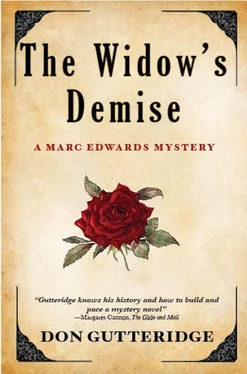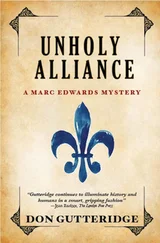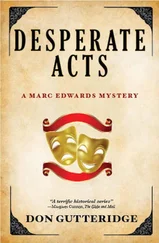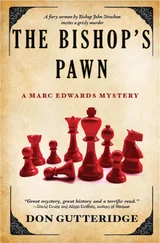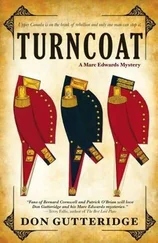Don Gutteridge - The Widow's Demise
Здесь есть возможность читать онлайн «Don Gutteridge - The Widow's Demise» весь текст электронной книги совершенно бесплатно (целиком полную версию без сокращений). В некоторых случаях можно слушать аудио, скачать через торрент в формате fb2 и присутствует краткое содержание. Год выпуска: 0101, Издательство: Bev Editions, Жанр: Исторический детектив, на английском языке. Описание произведения, (предисловие) а так же отзывы посетителей доступны на портале библиотеки ЛибКат.
- Название:The Widow's Demise
- Автор:
- Издательство:Bev Editions
- Жанр:
- Год:0101
- ISBN:нет данных
- Рейтинг книги:4 / 5. Голосов: 1
-
Избранное:Добавить в избранное
- Отзывы:
-
Ваша оценка:
- 80
- 1
- 2
- 3
- 4
- 5
The Widow's Demise: краткое содержание, описание и аннотация
Предлагаем к чтению аннотацию, описание, краткое содержание или предисловие (зависит от того, что написал сам автор книги «The Widow's Demise»). Если вы не нашли необходимую информацию о книге — напишите в комментариях, мы постараемся отыскать её.
The Widow's Demise — читать онлайн бесплатно полную книгу (весь текст) целиком
Ниже представлен текст книги, разбитый по страницам. Система сохранения места последней прочитанной страницы, позволяет с удобством читать онлайн бесплатно книгу «The Widow's Demise», без необходимости каждый раз заново искать на чём Вы остановились. Поставьте закладку, и сможете в любой момент перейти на страницу, на которой закончили чтение.
Интервал:
Закладка:
“I was . . . ah – disappointed.”
“And angry?”
“Yes, angry.”
“At Mr. Macy?”
“Yes.”
“But more at Mrs. Cardiff-Jones?”
“Yes.. She was a flirt and a man-chaser. Shewas just toying with Horace.”
“Angry enough to throw acid in her face?”
“No!” Constance cried. “I’d never dothat.”
“Where were you on the evening the crime tookplace?”
“I was at home. Preparing lessons. I’m aschoolteacher.”
“Can anyone corroborate that?”
“No, I was alone the entire evening.”
“Do you know Mrs. Marion Stokes?”
“Yes, I do.”
“Did you know that Mrs. Stokes and Mrs.Cardiff-Jones were best friends?”
Constance hesitated, unsure of theimplications of the question, then said, “Yes. Mrs. Stokes toldme.”
“So you could have written a forged note tolure Mrs. Cardiff-Jones out to her death?”
“But I did not, sir!”
“Milord,” said McBride, snapping to his feet.“Miss Brown is not on trial.”
“You’ve made your point, Counsellor. Moveon.”
“No more questions, Milord.”
McBride, in his rebuttal, got straight to thepoint. “Miss Brown, did you throw acid in Mrs. Cardiff-Jones’sface?”
“I did not.”
“Were you at home on the evening of thecrime?”
“I was.”
“Thank you. No more questions.”
McBride had done what he could, but Marc hadmade his point. Constance Brown could conceivably have killedDelores Cardiff-Jones.
At this stage, the judge announced that hehad to be out of town for a few days, and adjourned the trial untilnine o’clock next Monday morning. Marc was disappointed, as he hadthree more suspects ready for interrogation. Moreover, he only hadConstable Wilkie’s reference to Gagnon’s claim that there had beena third party present at the scene. What he needed now was awitness to the third party so that his suspects would seem evenmore plausible than they were. He now had five days to find such awitness.
TWELVE
When Cobb got home for lunch, he found his twochildren, Delia and Fabian, huddled over the stove and a large potof stew.
“Where’s yer mother?” Cobb said.
“She’s lying down,” Delia said. “ She justgot in.”
Cobb then remembered that Dora had not beenin their bed when he woke up this morning. That meant she had beenout on a call – some woman having a baby at a very inconvenienttime of day, as usual.
“We got your dinner, Dad,” said Fabianproudly.
“But it’s yer mother’s job,” Cobb said, andheaded for the bedroom.
Dora was not asleep. She was lying, all twohundred pounds of her, upon the duvet with her eyes closed and herclothes still on. “I’m tired through to the marrow of my bones,”she said to Cobb without opening her eyes.
“You been out all night, Missus Cobb?”
“Since three in the mornin’.”
“The kids’ve got dinner.”
“Bless ‘em.”
“I expect you’ll want to sleep.”
Dora struggled up and sat on the edge of thebed. “I do, but I got somethin’ that I gotta tell ya.”
“I don’t want to hear no details about thebirthin’.”
“Oh, don’t worry, it was an easy birth.Mother and babe are doin’ just fine.”
“Remember, we got a pact.”
They had agreed that Dora would not speak ofher midwifing activities if Cobb did not discuss the gorier aspectsof his work.
“You’ll wanta hear this, believe me,” Dorasaid.
“All right, then. Go ahead.”
“Peggy Jane Doyle, the young maid atRosewood, had her baby this mornin’ at ten o’clock.”
“But that part of town’s not yerterritory.”
“Right. But the regular woman was on anothercall, so they come fer me in the middle of the night.”
“What has Peggy Jane Doyle got to do withme?”
“Well, she was a bit delirious, and I heardher say, ‘Oh, poor Mrs. Jones, poor Mrs. Jones.’ And I figured shewas referrin’ to the night of her mistress’s death.”
“Very likely. Did she say anthin’ else?”
“She did. She kept repeatin’ ‘That man . . .I saw that man.’”
“She saw the killer?”
“I don’t know. She fell asleep. And probablystill is.”
“This could be important information,” Cobbsaid.
“I thought you talked to all themservants.”
“All but Peggy Jane Doyle,” Cobb said,upbraiding himself silently for the omission. “I’m gonna go rightover to Rosewood.”
“It may be too early.”
“We’ll see, won’t we?’
***
Cobb decided to approach Rosewood via the back door.Vera Mitchell answered his knock.
“Oh, it’s you, Constable Cobb.”
“I’d like to talk to Peggy Jane Doyle.”
“Oh, you can’t, I’m afraid. She’s . . .she’snot well.”
“I know she just had a baby,” Cobb said,stepping inside. “My wife delivered it.”
“So she did. I forgot she was married to you.But you see why Peggy can’t see you.”
“Would you mind seein’ if she’s awake. Thisis awfully important.”
“Well, if you insist.”
“I do.”
“Wait here while I check on her. She’s on acot in the kitchen.”
Vera disappeared down a short hall. Momentslater she returned. “Peggy’s awake,” she said, “but very weak.”
“Can she talk?”
“Yes. Follow me. And be very gentle.”
Cobb followed her into the kitchen, which wasempty save for the maid and her baby, lying on a cot in the cornernearest the stove. Cobb hoped the babe wasn’t feeding.
“Peggy Jane, the constable would like a wordwith you. Can you answer some questions?”
Peggy Jane, very young and very pale, lookedup from the babe in her arms and said in a soft voice, “I think so.I’ll try.”
“Mrs. Cobb heard you say that you saw a manon the night that yer mistress was killed,” Cobb said. “Is thatso?”
Peggy Jane adjusted the sleeping infant andsaid, “Yes. I saw a man.”
“Where were you?”
“I was on the stairwell. There’s a windowthere.”
“And what did you see outside thewindow?”
“I saw a man runnin’ along the east side ofthe house.”
“What time was this?”
“About seven-thirty. Usually I’m workin’upstairs.”
Cobb was elated. That was the time the acidwas thrown and Mrs. Cardiff-Jones died. This was undoubtedly thethird party that Gagnon had seen leaving the scene. Holding hisbreath, he said, “What did this man look like?”
“I just caught a glimpse of him. He wasmoving fast, But I don’t think he was a big man. He had on anovercoat and a hat. Grey, I think.”
“You didn’t see his face?”
“No. I was above lookin’ down.”
“I think that’s all the time you shouldtake,” Vera said. “Peggy Jane looks very faint to me.”
“That’s all I need to know,” Cobb said.
He thanked the women, and headed straight forBriar Cottage with his news.
***
Those people who crowded the Court House galleriesthe next Monday morning were treated to a surprise witness. A younggirl, pale and weak, was helped up to the witness-stand, where shewas allowed to sit. She gave her name as Peggy Jane Doyle. A buzzwent through the crowd as Marc led her through her testimony, whichwas a summary of Cobb’s interview with her. She said she had beencoming down the east stairs about seven-thirty when she happened toglance out the stairwell window and saw a male figure movingquickly along the east side of the house.
“Would you describe the man for us,” Marcsaid.
“I couldn’t see his face as he had a hat onand his coat was pulled up over his chin.”
“Was he tall? Short? Fat? Thin?”
“I only got a quick glimpse, sir. He wasn’ttall and I’d say he was on the thin side.”
Читать дальшеИнтервал:
Закладка:
Похожие книги на «The Widow's Demise»
Представляем Вашему вниманию похожие книги на «The Widow's Demise» списком для выбора. Мы отобрали схожую по названию и смыслу литературу в надежде предоставить читателям больше вариантов отыскать новые, интересные, ещё непрочитанные произведения.
Обсуждение, отзывы о книге «The Widow's Demise» и просто собственные мнения читателей. Оставьте ваши комментарии, напишите, что Вы думаете о произведении, его смысле или главных героях. Укажите что конкретно понравилось, а что нет, и почему Вы так считаете.
